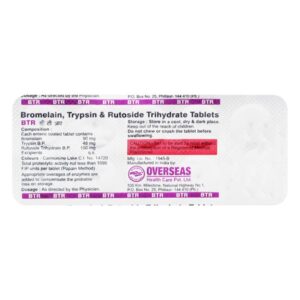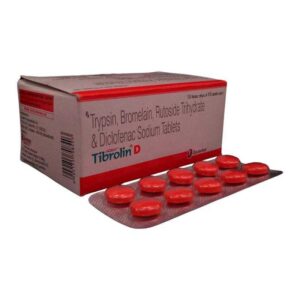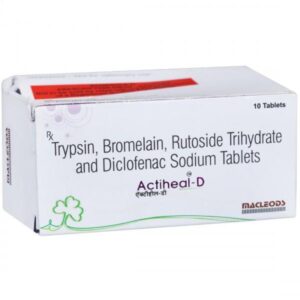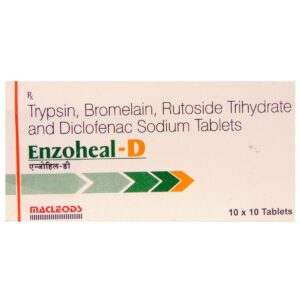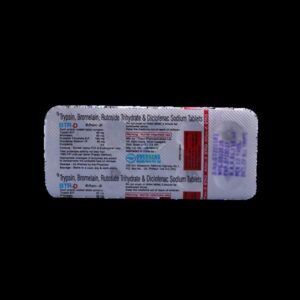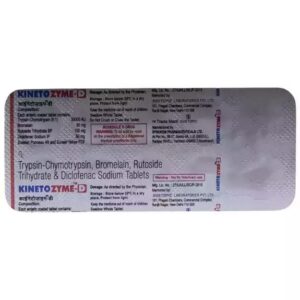DICLOFENAC + RUTIN + TRYPSIN + BROMELAIN
Diclofenac: Diclofenac is a nonsteroidal anti-inflammatory drug (NSAID) that is commonly used to relieve pain and reduce inflammation in conditions such as arthritis, migraines, and menstrual cramps. It comes in several different formulations, including pills, capsules, and topical gels.
The mechanism of action of diclofenac involves inhibiting the production of certain chemicals in the body called prostaglandins. Prostaglandins are involved in the process of inflammation, pain, and fever. By blocking their production, diclofenac helps to reduce pain and inflammation in the affected area.
The dose of diclofenac varies depending on the specific formulation and the condition being treated. Oral diclofenac tablets are typically taken 2 to 4 times a day, with or after food, while diclofenac gel is applied topically to the affected area 3 to 4 times a day. It is important to follow the dosing instructions provided by your healthcare provider.
Like any medication, diclofenac may cause side effects. Common side effects include stomach upset, heartburn, diarrhea, and nausea. Taking diclofenac with food can help reduce these gastrointestinal side effects. More serious but rare side effects may include bleeding or ulcers in the stomach or intestines, liver or kidney problems, and allergic reactions. It is important to seek immediate medical attention if you experience any severe side effects.
Diclofenac is not suitable for everyone, and it may interact with other medications. It is important to inform your healthcare provider about any other medications you are taking before starting diclofenac. Additionally, it should be used with caution in individuals with a history of stomach ulcers, liver or kidney disease, or heart conditions.
Overall, diclofenac is an effective medication for relieving pain and reducing inflammation. However, it should be used under the guidance of a healthcare professional and with proper consideration of the potential side effects and interactions.
Rutin: Drug: Rutin
Use: Rutin is a flavonoid glycoside that is commonly used as a dietary supplement. It is found in certain fruits, vegetables, and plant-based products. Rutin is primarily used for its antioxidant and anti-inflammatory properties. It is often taken to support cardiovascular health, strengthen blood vessels, and reduce the risk of certain chronic diseases.
Mechanism of Action: Rutin exerts its effects by scavenging harmful free radicals and decreasing inflammation in the body. It helps protect cells from oxidative damage and reduces the production of inflammatory molecules. Rutin also improves the strength and elasticity of blood vessels, which can contribute to better cardiovascular health.
Dose: The recommended dosage of Rutin may vary depending on the reason for use. Typically, the daily dosage ranges from 500 mg to 1000 mg. It is available in the form of capsules or tablets. It is important to follow the instructions provided by the manufacturer or consult a healthcare professional for accurate dosage information.
Side Effects: Rutin is generally considered safe for most individuals when taken in recommended doses. However, some individuals may experience mild side effects such as stomach upset, diarrhea, or headache. Allergic reactions to Rutin are rare but possible. If any severe side effects or allergic reactions occur, it is important to seek medical attention immediately.
It is worth noting that Rutin may interact with certain medications, such as blood thinners, and can also affect the absorption of certain minerals. Therefore, it is advisable to consult a healthcare professional or pharmacist before starting Rutin supplementation to ensure its safe and appropriate use.
Trypsin: Trypsin is a drug that belongs to the class of enzymes known as proteases. It is extracted from the pancreas of animals, usually pigs or cows. Trypsin is commonly used in medicine as a digestive aid and also as a topical treatment for wound healing and inflammation.
The main mechanism of action of trypsin is its ability to break down proteins into smaller peptides. It does this by cleaving peptide bonds between specific amino acids. This enzymatic activity helps in the digestion of proteins in the gastrointestinal tract, facilitating their absorption and utilization by the body.
In topical applications, trypsin is used to remove dead tissue and debris from wounds, promoting the healing process. It works by breaking down the proteins that make up the dead tissue, allowing healthy tissue to regenerate. Additionally, trypsin has anti-inflammatory properties that can help reduce swelling and alleviate pain associated with wounds or inflammation.
The dose of trypsin depends on the specific condition being treated and the form in which it is administered. For digestive aid, trypsin is typically taken orally in the form of pancreatic enzyme preparations. These preparations are available in different strengths and should be taken according to the prescribing doctor’s instructions.
For topical use, trypsin is usually found in the form of ointments or creams. The affected area should be cleaned before applying the ointment, and the ointment should be spread evenly over the wound. Again, the specific dosage and frequency of application will depend on the doctor’s instructions.
As with any medication, trypsin may cause side effects. Common side effects include nausea, diarrhea, and abdominal pain when taken orally. Skin irritation or redness may occur with topical use. Some individuals may also experience allergic reactions, although these are rare.
It is important to note that trypsin should not be used by individuals who have known allergies to pork or any other component of the medication. It is always recommended to consult with a healthcare professional before starting any new medication to ensure it is safe and appropriate for the individual’s specific condition.
Bromelain: Drug: Bromelain
Use: Bromelain is a natural enzyme derived from pineapple that has been used as a dietary supplement. It is primarily used as a digestive aid to break down proteins and improve digestion. Additionally, it is also used for its anti-inflammatory and anticancer properties.
Mechanism of Action: Bromelain works by breaking down proteins into smaller peptides and amino acids, which enhances the digestion process. It also has anti-inflammatory properties by inhibiting certain molecules responsible for inflammation in the body. The exact mechanism of its anticancer effects is not fully understood but it has been suggested that it may inhibit the growth of cancer cells and enhance the immune response against them.
Dose: The recommended dose of bromelain can vary depending on the specific product and its formulation. Typical doses for oral use range from 500 mg to 2000 mg per day, divided into multiple doses. It is important to follow the instructions provided on the label or as directed by a healthcare professional.
Side Effects: Bromelain is generally considered safe when taken in appropriate doses. However, some individuals may experience mild side effects such as nausea, diarrhea, stomach pain, or allergic reactions including itching and rash. In rare cases, high doses of bromelain may cause more severe allergic reactions including swelling of the tongue or throat, difficulty breathing, or anaphylaxis. It is important to consult with a healthcare professional before taking bromelain, especially if you have any known allergies or medical conditions.

